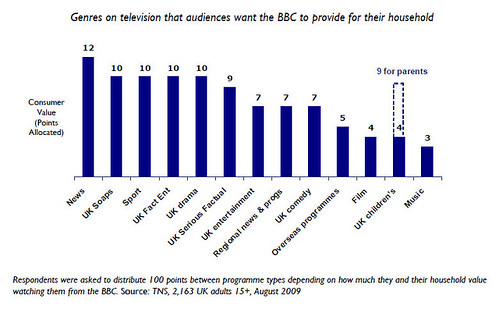I love the BBC, but I tend to worry about it a lot.
On p70 of Mark Thompson’s Strategic Review, I found the kind of evidence that supports my fears. The paragraph that gripped me refers to the future of BBC Online. It goes like this:
There will be no specialist content for a specialist audience, such as business-critical information in specialist fields, legal, financial (including trading tools) or other professional content.
Whoa. Trading tools? Specialist legal and financial content? Business-critical information? The idea of the BBC becoming a large-scale B2B publisher is sufficiently bonkers that it should have been suppressed violently the minute it surfaced in conversation at Broadcasting House.
But no: here it is, incendiary to the last, disclosed in an apparently serious document about the future of the BBC.
This is the kind of thing that makes you wonder about how far the BBC’s ambitions ran at the high point of the Long Boom. It also makes you wonder about how the Strategy Review will change the balance of power between the BBC and commercial rivals who largely make a living from the written word.
Much remains to be clarified. But here is what Mark Thompson is promising:
- BBC Online’s budget will be cut by 25% by 2013, ‘with a corresponding reduction in staffing levels”
- BBC Online will cut ‘whole categories of online activity such as web search, communications and non-content related social networking”.
- The number of sections on BBC Online ( ‘top-level directories’, in the form of bbc.co.uk/sitename) will be halved by 2012, with many sites closed and others consolidated. There will be far fewer bespoke programme websites.
- “Removing generic content [from BBC Online] in areas such as the Recipe Finder and /film
- BBC Online will feed more traffic to the nationals: ‘by 2012, an external link on every page and at least double the current rate of ‘click-throughs’ to external sites”
- Local BBC sites in England restricted to news, sport, weather, travel and local coverage of national projects like Coast and A History of the World in 100 Objects. The BBC ‘will not provide listings, local guides or similar feature material”.
- “Leaving room for local newspapers and others to develop in a digital world by keeping the BBC’s current pattern of local services, and not launching new services in England at any more local a level than today.”
Potentially, there’s some important stuff here. Yet Mark Thompson’s Strategy Review also contains what diplomats would describe as ‘red lines”. These are fundamental points of principle from which the Corporation will not budge.
News is non-negotiable. As the BBC’s own research demonstrates, taxpayers want the Corporation to generate news more than anything else. The graphic reproduced at the top of this post –- extracted from the Strategic Review — underlines that fact.
Although the researchers asked respondents what they wanted from the BBC on their television sets, the BBC regards online as an indivisible part of the whole. On p33 of the Strategy Review, directly beneath the graph I’ve reproduced here, Thompson’s document contains the following words: ‘Content delivered via digital platforms is a vital part of this story.”
Elsewhere, the language is stronger. Consider, for example, the Review’s (eminently sensible) suggestion that the web ‘may [become] the only platform and delivery system that the BBC needs to fulfil its public purposes”. When it comes to the clash of civilisations between TV, text and audio, the BBC intends to be a fully-committed combatant.
Indeed, if all goes according to plan, the BBC’s Great Reprioritisation should intensify competition with private sector news organisations. Take a look, for example, at these priorities, laid out for BBC news journalism across all media:
- Stronger specialist analysis of science, the environment and social affairs
- More business coverage (local and global)
- More international news
- More coverage of local UK politics (”multiplatform coverage of local government and politics through Democracy Live”)
Specifically, for BBC Online, the report promises:
- “More prominence” for audiovisual content, original journalism, expertise and analysis
- Better quality local news websites
- “Stronger” consolidated “knowledge” output in areas like Nature and Music
- BBC News Online to focus ‘on a generalist, not specialist, audience”
- Entertainment news to become ‘more serious and concise’with stronger coverage of the media industry, culture and the arts
That’s some shopping list. Consider, too, the hint (on p50) that many of the redundancies at BBC Online will affect technical staff, rather than journalists. (The job cuts, we’re told, will partly reflect ‘the growing maturity and commoditisation of web design and technology”).
Notably, too, many of the sub-domains earmarked for closure provide readers with entertainment, rather than news. Rival publishers will find it hard to get excited by the prospect of sites like /robinhood being ‘consolidated under larger audience-facing propositions”. (p49).
So the basic conflict, sharpened by recession, still exists. It’s unlikely to ever be resolved. On the one hand, commercial publishers argue that the BBC is crowding them out of the market. On the other, the BBC argues that taxpayers want it to provide news more than anything else.
At first, the BBC’s Strategy Review looked like a retreat under pressure. But a steely bureaucratic determination runs through the core of this document. Where it matters most, the BBC will not be moved and may even succeed in upping its game.
Email pged@pressgazette.co.uk to point out mistakes, provide story tips or send in a letter for publication on our "Letters Page" blog







